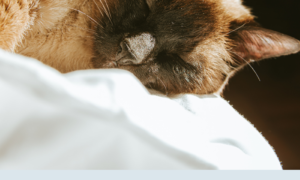 While it isn’t certain who began National Hairball Awareness Day, a special day to highlight causes, treatments and prevention of hairballs, it takes place the third week of every April, falling on Friday, April 26 this year.
While it isn’t certain who began National Hairball Awareness Day, a special day to highlight causes, treatments and prevention of hairballs, it takes place the third week of every April, falling on Friday, April 26 this year.
The occurrence of hairballs used to be simple to explain when cats primarily lived outdoors: Their shedding cycle was determined by natural cycles of light that occur in nature. They shed their thicker winter coats in spring in exchange for a thinner summer coat. The situation reversed itself once the weather turned colder, and hours of light diminished.
However, an indoor cat’s body is thrown off by living indoors where lights are on at hours that don’t coincide with Mother Nature.
Other reasons a cat’s body is thrown off its natural coat shedding rhythms include temperature, nutrition, hormones, body chemicals, genetics and the health of the cat.
Hairballs are balls of hair that form in a cat’s stomach as a result of grooming. While any cat can develop a hairball, they tend to be more prevalent in long-haired cats. Hairballs are ejected from the stomach in long, moist tubes called trichobezoars. While it’s normal for cats to have hairballs on occasion, it isn’t normal to have them multiple times a week.
Hairballs are more than an annoyance for pet parents, they can cause serious health issues requiring veterinary care:
- Ongoing vomiting, gagging, retching or hacking without producing a hairball
- Lack of appetite
- Lethargy
- Constipation (intestinal blockage may have taken place)
- Diarrhea
- Bloated abdomen
Fortunately, there are simple ways to prevent hairballs from forming:
- Frequently brush your cat
- Feed your cat specially formulated food
- Give your cat a hairball remedy like Petromalt or Laxatone
What’s of vital importance is to be ever-vigilant about any changes in your cat’s behavior because cats are experts at covering up health issues. So, if you notice any changes in your cat’s behavior, such as eating, litter box usage, or energy level, consult your veterinarian right away.






